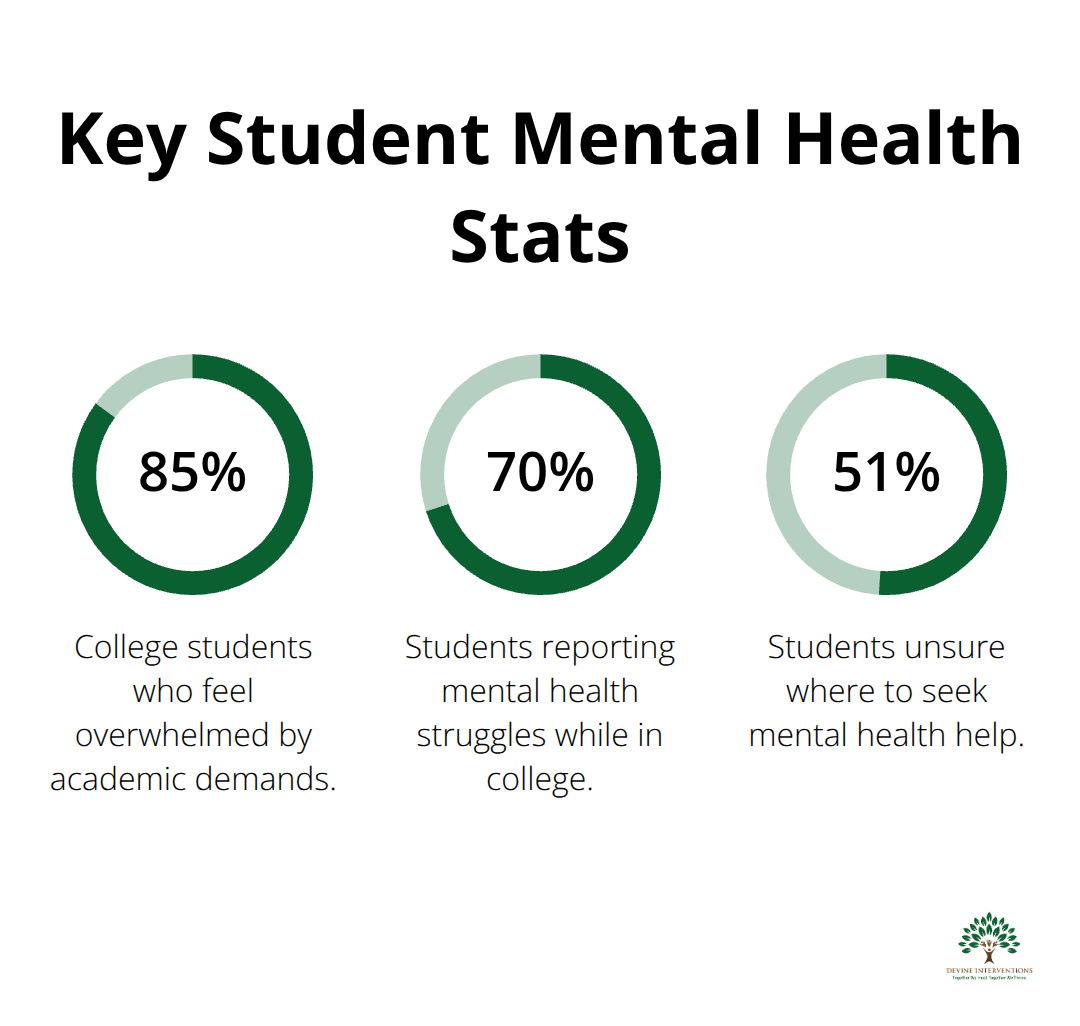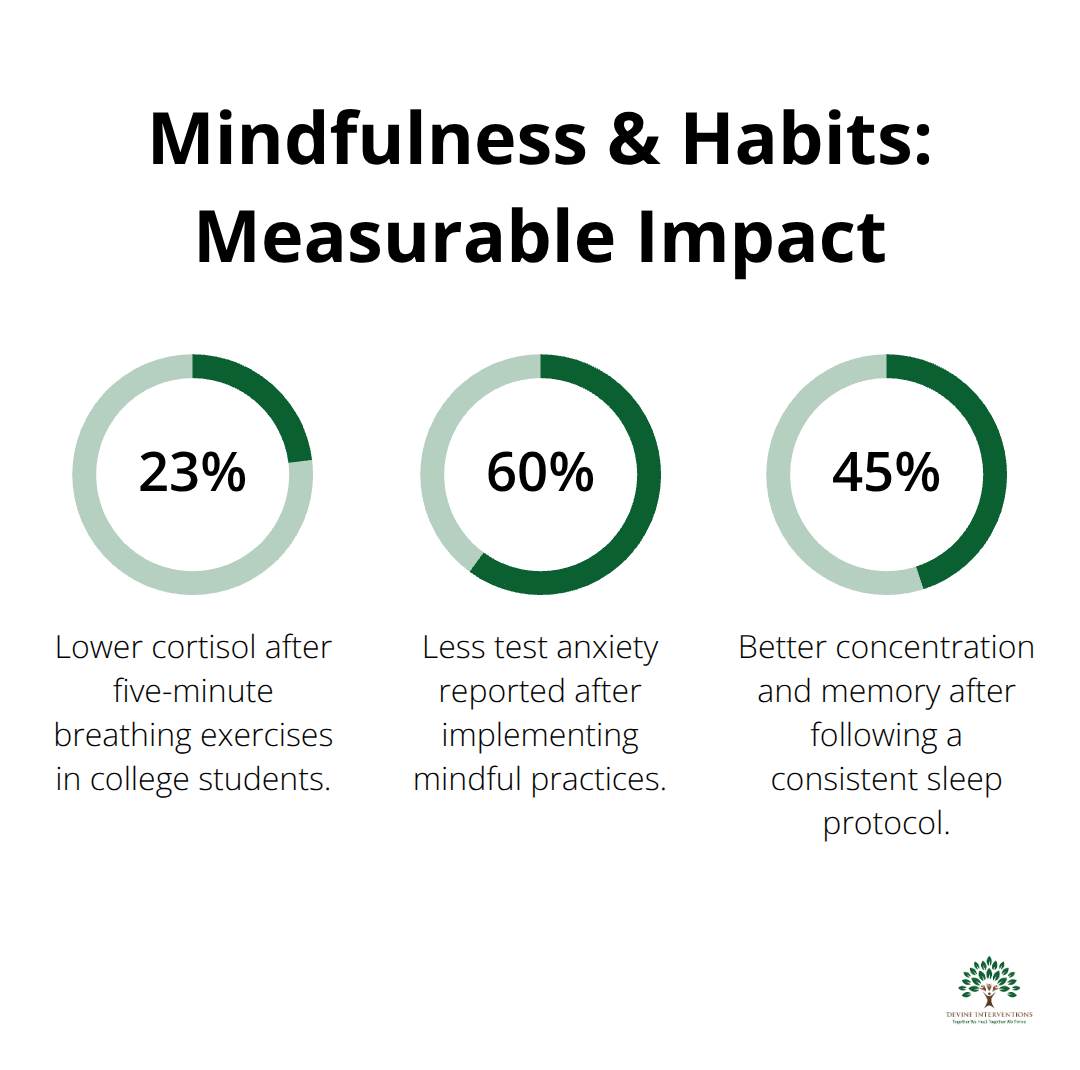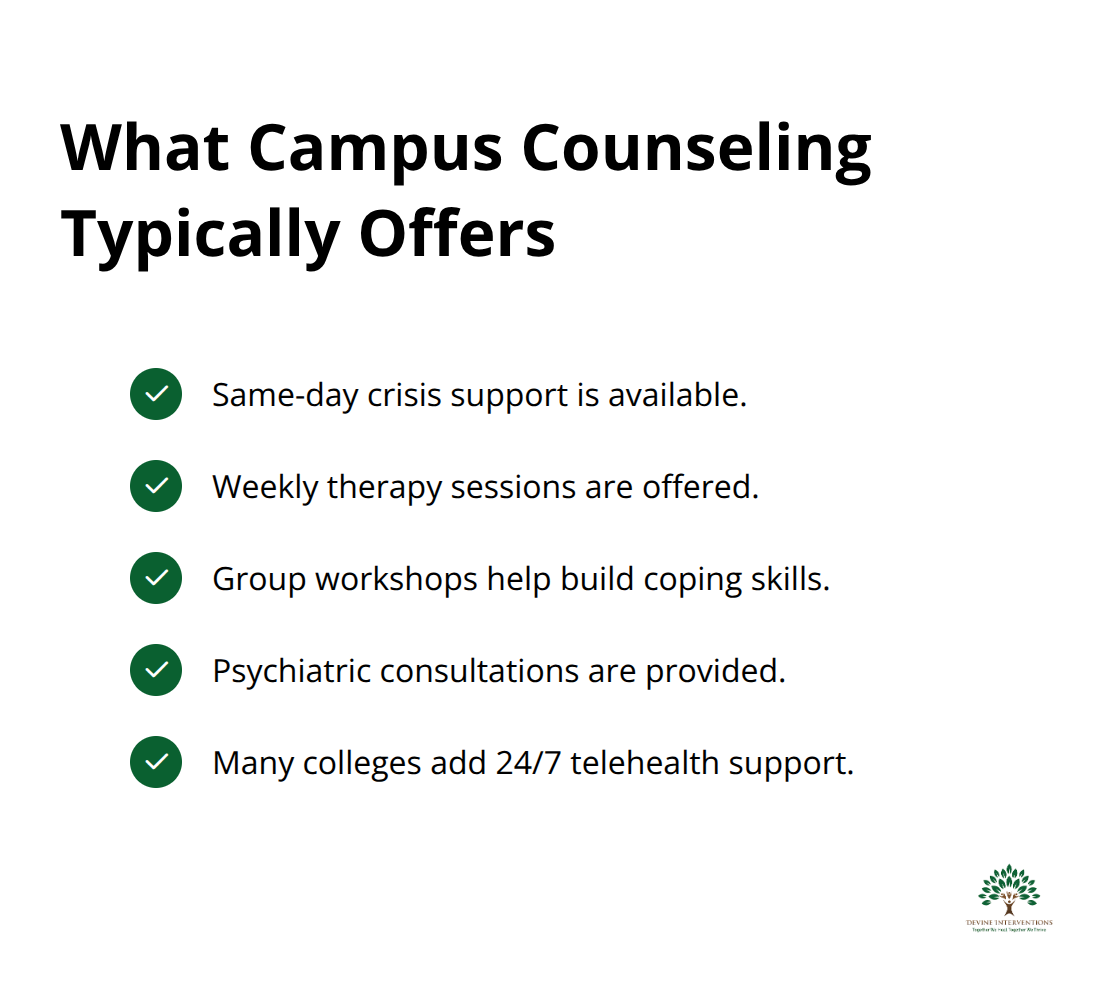Student mental health challenges have reached unprecedented levels, with 85% of college students reporting feeling overwhelmed by academic demands according to recent American College Health Association data.
At Devine Interventions, we understand that developing effective mental health coping strategies for students isn’t just about managing stress-it’s about building lifelong resilience skills. The right techniques can transform how students handle pressure, relationships, and uncertainty about their future.
What Mental Health Challenges Hit Students Hardest
Academic Pressure Creates a Perfect Storm
Modern students face academic stress that goes far beyond what previous generations experienced. Seventy percent of college students report mental health struggles while in college. Performance anxiety now starts earlier and hits harder, with students who feel constant pressure to maintain perfect GPAs while they juggle multiple commitments. This chronic stress triggers physical symptoms like fatigue, mood swings, and concentration problems that compound over time.

The American College Health Association data shows that academic demands have intensified dramatically. Students report they feel trapped in a cycle where poor performance increases anxiety, which then makes it even harder to focus and succeed. Sleep deprivation becomes the norm, with most students who get far less than the recommended amount needed for proper cognitive function and emotional regulation.
Social Connections Suffer Under Modern Pressures
Social isolation among students has reached crisis levels, particularly after the pandemic reshaped how young people connect. Up to 51% of students express uncertainty about where to seek mental health help, which creates a dangerous gap between those who struggle alone and those who get support. Students who experience depressive symptoms are significantly less likely to confide in friends about their emotional struggles, which creates a vicious cycle of isolation.
The data reveals a troubling pattern: 76.3% to 89.3% of students would seek help from friends during mental health crises, yet many lack the social networks to make this possible. Financial pressures force students to work longer hours, which leaves less time for relationship development. This combination creates perfect conditions for anxiety and depression to flourish unchecked.
Financial Stress Compounds Every Other Challenge
Financial uncertainty doesn’t just create stress about bills – it amplifies every other mental health challenge students face. When students worry about basic necessities, they can’t focus properly on academics or maintain healthy social relationships. The constant background anxiety about money creates a state of chronic stress that makes other coping strategies less effective.
Students often delay mental health support due to cost concerns, even when free campus resources exist. This delay allows problems to worsen, which makes eventual treatment more complex and time-intensive. The irony is clear: financial stress prevents students from access to the very resources that could help them succeed academically and improve their long-term potential.
These interconnected challenges create a complex web that requires targeted, evidence-based strategies to break through effectively.
Which Proven Techniques Actually Reduce Student Stress
Master Your Mind With Cognitive Restructuring
Cognitive behavioral techniques work because they target the root cause of student anxiety: distorted thought patterns. When students learn to identify catastrophic thoughts like “If I fail this exam, my entire future is ruined,” they can challenge these with evidence-based questions. Research shows that cognitive behavioral therapy is effective in addressing behavioral challenges among students. The key involves writing down worried thoughts, then asking three questions: What evidence supports this? What would I tell a friend who had this thought? What’s a more balanced perspective?
Students who use the “thought record” method daily report significant improvements in sleep quality and concentration. This technique involves documenting the situation, emotional intensity (on a scale of 1-10), the automatic thought, and a more realistic response. Most students see measurable changes within two weeks of consistent practice.
Build Resilience Through Strategic Mindfulness
Mindfulness practices specifically designed for students focus on brief, targeted interventions rather than lengthy meditation sessions. Research published in the Journal of Medical Association of Thailand shows that even five-minute breathing exercises reduce cortisol levels by 23% in college populations. The most effective technique for students is the “54321 grounding method”: identify 5 things you can see, 4 you can touch, 3 you can hear, 2 you can smell, and 1 you can taste.
Body scan exercises work particularly well during study breaks. Students spend just three minutes and focus attention from head to toe, which resets their nervous system and improves focus for the next study session. The Pomodoro Technique combined with mindful breathing creates powerful stress relief while it maintains productivity. Students who implement these practices report 60% less test anxiety according to recent university wellness center data.

Transform Daily Habits Into Mental Health Tools
Physical exercise remains the most underutilized yet effective stress management tool available to students. The British Medical Journal published findings in 2024 that show even light physical activity like walking reduces anxiety and depression symptoms more effectively than many medications. Students need just 20 minutes of movement daily to see significant mood improvements. The timing matters: morning exercise provides all-day stress protection, while evening workouts improve sleep quality.
Sleep optimization requires strict boundaries that most students resist but desperately need. The National Sleep Foundation recommends seven to nine hours nightly for adults for proper cognitive function. The most effective approach involves setting a non-negotiable bedtime, eliminating screens one hour before sleep, and maintaining consistent wake times even on weekends. Students who follow this protocol report 45% better concentration and memory retention within three weeks.
These evidence-based strategies create the foundation for mental wellness, but they work best when students have strong support systems to reinforce their efforts and provide guidance when challenges arise.
How to Build the Right Support Team
Access Campus Mental Health Resources Before You Need Them
Campus mental health resources work best when students understand exactly what services exist and how to access them quickly. Most colleges offer free counseling for a limited number of visits, yet 70% of students have struggled with mental health since starting college. The most effective approach involves scheduling an initial appointment before you actually need it, similar to establishing care with a primary physician.
Campus counseling centers typically provide same-day crisis support, weekly therapy sessions, group workshops, and psychiatric consultations. Students who connect with services early report better success rates in receiving immediate or same-week support, compared to much longer wait times during peak stress periods like finals. Many colleges partner with national telehealth services to provide round-the-clock mental health support for students who need immediate assistance.

Create Strategic Peer Networks That Actually Help
Effective peer support goes beyond casual friendships and requires intentional relationship development focused on mental wellness. Research shows that students would seek help from friends during mental health crises, but many lack the structured networks to make this possible. The most successful approach involves forming accountability partnerships with classmates who share similar academic goals and stress management commitments.
These partnerships include weekly check-ins about mental health, shared study sessions that incorporate stress reduction techniques, and mutual agreement to recognize warning signs in each other. Students in structured peer support programs report lower anxiety levels and significantly better academic performance. Organizations like NAMI On Campus provide frameworks for these relationships, teaching students how to build a strong support network without becoming overwhelmed by others’ problems.
Recognize When Professional Intervention Becomes Necessary
Professional help becomes necessary when daily functioning deteriorates despite consistent self-care efforts and peer support. Clear indicators include sleep disruption lasting more than two weeks, inability to concentrate during classes or study sessions, persistent thoughts of self-harm, or substance use as a coping mechanism. Students who experience these symptoms should contact campus mental health services immediately rather than wait for symptoms to worsen.
The 988 Lifeline provides 24-hour support for immediate concerns. When campus resources have waiting lists or limited availability, comprehensive mental health services that specialize in student populations can provide individual therapy, group sessions, and medication management specifically designed for young adults facing complex mental health challenges.
Final Thoughts
Students who implement cognitive behavioral techniques, mindfulness practices, and healthy lifestyle habits see measurable improvements within weeks. These mental health coping strategies for students become more powerful when combined with strong peer networks and accessible campus resources. Early intervention makes the difference between manageable stress and overwhelming mental health crises.
Students who connect with support services before they reach crisis points report better outcomes and faster recovery times. The 988 Lifeline provides immediate support for urgent situations. Campus counseling centers offer ongoing care that addresses both immediate concerns and long-term wellness goals.
We at Devine Interventions understand that student mental health challenges require specialized, comprehensive care. Our therapy services and intensive outpatient programs help young adults who face complex mental health challenges (including anxiety, depression, and stress-related disorders). Contact us today to learn how our integrated approach can help you build lasting resilience and achieve your academic goals while you maintain your mental wellness.







